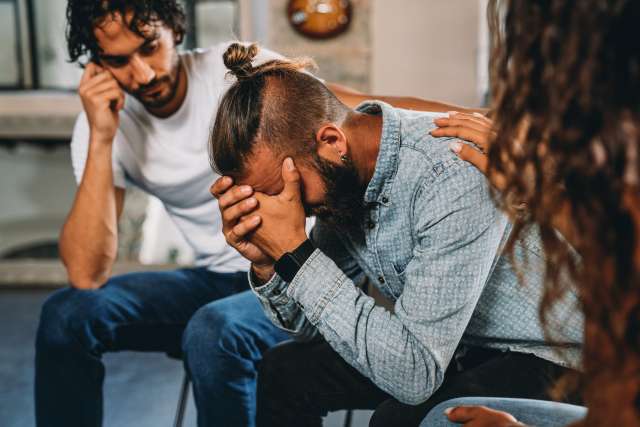Most people who have been diagnosed with cancer find that strong support from a spouse or partner is a huge benefit during the treatment and healing journey.
But the flip side to that is that these loved ones also go through an overwhelming process of stress, fears, guilt and frustrations, and might not have anyone to listen to their feelings.
To help these partners, the Simms/Mann UCLA Center for Integrative Oncology provides two unique support groups – one for partners who have lost their loved one to cancer, and another for men helping a wife or partner get through the challenging experience of cancer treatments.
facilitates the groups with the understanding that partners need support too – and that no one is better-suited to provide that support than others going through the same ordeal and who can relate to the challenges. Dr. Lottenberg knows this very well, having lost his wife, Hilary, to her second bout with cancer in 2021.
"This is a very intense human experience that can really overwhelm you and stress you out. Members of our groups are thankful for the chance to meet with people who are going through the same thing," Dr. Lottenberg said.
"Support groups are really important for just that – so these people do not feel alone. The feedback I get is that they now feel part of a community, and they don't suffer as much unwanted loneliness," he said. "They end up having more hope – that they will be able to live their life even after losing a loved one to cancer."
Focusing on the human psyche
After starting his medical career studying the brain and nuclear medicine, Dr. Lottenberg became fascinated with learning more about the human psyche in terms of dealing with tragedy and change. So he earned a doctorate in Clinical Psychology, about 20 years after receiving his MD, to better understand the human mind.
"I found that I wanted to focus more on the humanity, or the 'hearts' of people," Dr. Lottenberg said. "I wanted to be more hands-on with people, beyond the work I did with imaging and radiology. It has been a tremendous growth experience for me, since I get to learn from each member of every group."
Dr. Lottenberg became facilitator of the Simms/Mann Center’s Husbands/Partners Support Group in 2009, and subsequently added the Spousal Bereavement Group. The former offers men a chance to express their fears and frustrations – feelings they might not want to share with their partners; the latter provides support to those coping with the extreme life change of losing a partner and learning to go on with life.
Both groups emphasize treating the whole person in mind, body and spirit. Dr. Lottenberg encourages members to engage in stress-reducing activities such as yoga, meditation and art.
Acknowledging that pain is part of life
Leaning on his medical and psychology background, along with his personal experience with cancer and loss, Lottenberg encourages group members to accept that being human involves learning to handle change, even one as dramatic as losing a partner.
"To be human is to visit what I call Earth school here. And while we're in Earth school, we are dealing with different phases of pain in our life. And what we have in our groups are people who are going through this phase of pain right now," Dr. Lottenberg said.
"There is no avoiding this,” he said. “It's OK to use our tear ducts and cry our eyes out, and just feel the pain and express it. We have to find a way to accept the loss and process it. It all comes back to our humanity, and learning to adapt and continue with our lives. For most people, it really helps to be able to talk about it – to share our feelings with others, in a safe place where people listen to you."
The human mind, he said, is able to process change and adapt very well. He encourages group members ultimately to focus on positive thoughts for the future.
"I look at the brain as a marvelous tool but a horrible master sometimes. We need to let out our emotions for sure, but we want to avoid flooding our brains with thoughts of disaster pending in the future," Dr. Lottenberg said. "Eventually, our group members come around to accepting that loss is a part of life, and we would rather deal with painful loss than never to have had that special relationship with that dear loved one. It is much easier to come to that frame of mind when you can talk to others in the same position, to sort of normalize and validate your feelings."
The support groups have worked so well that some members get together outside of the group to support each other, Dr. Lottenberg said. That makes his day, knowing that the group is helping people through such a difficult period.
"I am very blessed to be able to do this work – I get a great feeling that I'm really making a difference in group members' lives," he said. "I could retire, but the work is just so important, and so fulfilling for me, that I hope to keep doing these groups for quite awhile."





